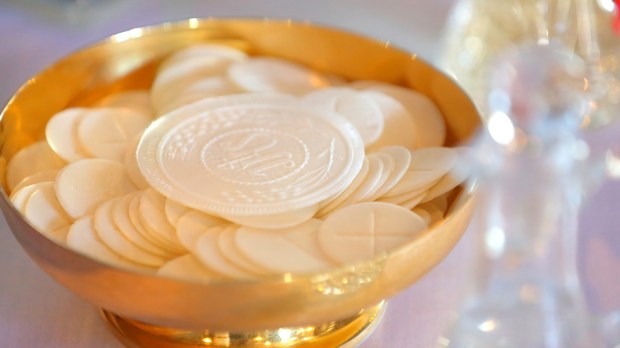It has been pointed out many times in the past, but it doesn’t hurt to reflect on it once again, as we celebrate Thanksgiving Day: the Greek-derived word for thanksgiving is “eucharist,” the same word that refers to both the Catholic Mass and the sacrament of Holy Communion.
It’s no surprise, then, that many Catholics make a point of beginning their Thanksgiving Day with a visit to church, even though it is a civil holiday and not a religious day of obligation.
“The whole liturgical life of the Church revolves around the Eucharistic sacrifice and the sacraments,” the Catechism of the Catholic Church explains. It is called Eucharist “because it is an action of thanksgiving to God. The Greek words eucharistein and eulogein recall the Jewish blessings that proclaim —especially during a meal— God’s works: creation, redemption, and sanctification.”
“The name ‘Eucharist,’ or thanksgiving, is to be explained either by the fact that at its institution Christ “gave thanks,” or by the fact that this is the supreme act of Christian gratitude to God,” writes Jesuit Fr. John A. Hardon in his Catholic Catechism. “Early instances of this title occur in the Teaching of the Twelve Apostles, in the letters of St. Ignatius of Antioch, and in the Apologies of St. Justin.”
Christ Our Pascha, the Catechism of the Ukrainian Greek Catholic Church, puts it this way:
The mystery of the Eucharist takes its name from this prayer of thanksgiving in which we express gratitude for all that we have received from God. We thank God “for all things which we know and do not know, the benefits bestowed upon us, both manifest and hidden.” This gratitude-thanksgiving precedes all petitions for our needs. This is because we realize that, having given us his Son and the Holy Spirit, he has given us all for our salvation. Praying to God, the “ineffable, inconceivable, invisible, incomprehensible,” we confess that he is infinitely greater than all that we know or can say about him or his deeds. We thank God for creation: “[he] brought us from nothingness into being,” and for salvation: “After we fell [he] raised us up again [and] did not cease doing everything until [he] led us to heaven and granted us [his] future kingdom.
St. John Vianney had a special devotion to the Eucharist. In one of his meditations, he wrote of the spirit of thanksgiving after receiving Communion: “When we leave the altar rails we are as happy as the Magi would have been if they had been able to carry off the Infant Jesus.”
Another saint, St. Peter Julian Eymard, is known as the Saint of the Eucharist. In fact, he founded a religious order, the Congregation of the Blessed Sacrament, whose mission is to share the riches of God’s love manifested in the Eucharist. St. Peter Julian gets to the heart of the matter when he writes that the highest form of thanksgiving the devout Christian can make in response to the Eucharist is a complete gift of himself.
“Belong entirely to God through love, entirely to your neighbor through a gracious charity, entirely to the divine Eucharist by the offering and sacrifice of your whole self,” he wrote. “Bear with yourself in the patience of our Lord.”
And that can be done every day, not only on Thanksgiving.

